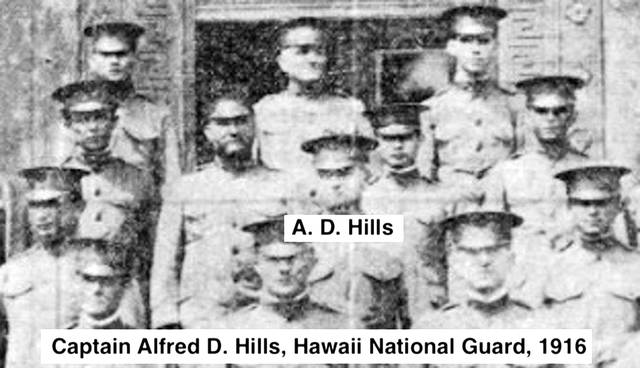A.D. Hills (1874-1952), the “Copra King of Kauai,” was born in Tahiti, the son of an English army officer and the grandson of a French admiral and a Tahitian princess.
His mother, Nuu Arei Hills, and his father, Major F. J. Hills, along with him and his two brothers, William and John, left Tahiti for Hawaii in 1884, where his parents started the Tahiti Lemonade Works and the Hawaiian Soda Works in Honolulu.
Hills became the manager of Lihue Ice &Electric Co. in 1900, and shortly thereafter obtained the lease to the Lindemann coconut grove and adjacent property at the mouth of the Wailua River for the purpose of producing and exporting copra.
Five years later, in 1905, Hills purchased ownership of his Wailua property and built his home on it between the ocean and the lagoon, which during the 1830s and 1840s had been the homesite of Queen Deborah Kapule (1798-1853).
Hills’ grove, comprised of about 4,200 coconut trees, had been planted very close together on 45 acres by German immigrant Ernest F. Lindemann (1842-1922) in the 1890s with coconuts he’d procured from Samoa.
The coconut trees seen today at Coco Palms are situated on property that had once been a part of Hills’ coconut grove.
During World War I, Alfred David Hills served as a captain in the Kauai Regiment of the National Guard of Hawaii.
Another Kauai copra planter active during Hills’ time was E.H. Broadbent, Grove Farm Plantation manager from 1902 to 1935.
Broadbent planted 1,100 coconut trees on 15 acres at nearby Waipouli in 1911, and made his first commercial shipment of 30 bags of copra and 20 bags of coconuts in May 1919.
A number of Broadbent’s trees are still standing.
In 1951, Hills renovated his home and opened it to the public as the Coco Palms Lodge.
Two years later, his widow, Veda Hills, sold the lodge to Lyle Guslander, whose wife, Grace Buscher Guslander, transformed it into the Coco Palms Hotel, the best-known resort in all Hawaii.


